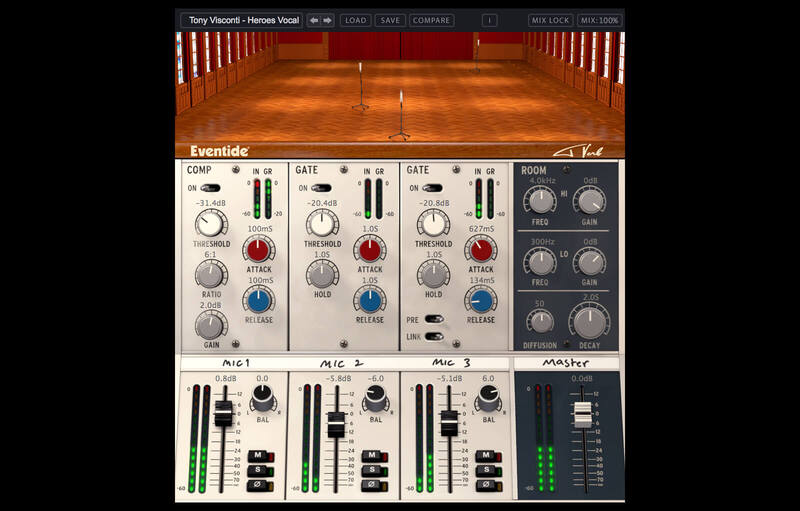The Sound of a Legend
Tverb was developed in collaboration with legendary producer, engineer and musician, Tony Visconti. The plug-in was inspired by the iconic sound of the title track of David Bowie’s twelfth studio album, Heroes, recorded in August 1977 in the shadow of the Berlin Wall.
With only one track left for lead vocals, Visconti was able to harness the power of Bowie’s voice by inventing a stunning recording technique. This technique is the foundation of Tverb.
Visconti set up three microphones in the hall of Berlin’s Hansa Studios, the first for Bowie to sing directly into, a second positioned about 15 feet away and the third further back in the hall.
Visconti placed gates on the second and third microphones set to open as Bowie sang louder and louder.
Signature Techniques
Tverb integrates three completely independent lush reverbs with compression and selectable polar patterns on microphone 1 and adjustable gates on microphones 2 and 3. Tverb recreates Visconti’s iconic effect as a starting point while adding features that enable new soundscapes and effects. The use of stereo microphones enhances the effect and DAW automation can be used to program the microphones to wander around the hall as the track plays.
Inspiration of the Past/Power of the Future
Tverb was designed with a new level of efficiency for plug-ins.
It captures the rich ambience of Hansa’s studio 2, the historic Meistersaal concert hall, without burdening your DAW’s CPU. Tverb features three independent reverbs, with the ability for the two far microphones to be convincingly placed anywhere in the hall.
MAIN FEATURES
- 2 Moveable microphones to adjust reverb size and tone
- Adjustable polar patterns for microphone 1 to adjust the amount of ambient room tone
- Custom Eventide reverb algorithm with EQ, diffusion, and decay control
- Compressor module on microphone 1, just as Visconti had in the original session
- 2 Linkable post-reverb gate modules with control of when the gates close, the speed at which they close and the length of time they are forced to stay open
- Console (inspired by the one used in the session and with Visconti’s “grease pencil” labelling) provides post-reverb channel processing for each individual mic and the master
- Room mixer module alters the sound of the room itself with control over decay, diffusion and frequency attenuation
- Signal inversion buttons to remove (or create) phase cancellation
- Mix Lock allows for scrolling through presets or settings while keeping the wet/dry mix constant
- Complete automation support
PC
- Windows 8 and later (32 / 64bit)
- AAX, VST2, VST3 (32 / 64-bit)
Mac
- macOS 10.9 and later (64-bit only) (macOS 11 Big Sur only supported on Intel-based Mac systems)
- AAX, AU, VST2, VST3 (64-bit)
Notes:
- Eventide tests their desktop plugins in Ableton Live, Cubase, FL Studio, Logic Pro, Pro Tools, and Studio One (However, our plugins should work with any compatible host.)
- New 32-bit macOS installers are no longer being made for this product.
- No iLok dongle is required to run this software – only a FREE iLok account/Manager is required for authorisation.
- macOS 11 Big Sur is only supported on Intel-based Mac systems.
Important – To use Eventide plugins on an M1 Mac, you may need to launch your DAW under Rosetta (right-click the application icon, select “Get Info” and then select “Open using Rosetta”). Note that many DAWs do not yet support macOS Big Sur, so it is important to check your DAW’s website for compatibility info before updating.




















